Stand Together is an amazing initiative located across Allegheny County. The program joins with local youth to break down the stigma associated with mental illness and substance use disorders. Recently, we did a post on the work the program does. SOVA also had the opportunity to sit down with Stand Together’s Project Coordinator, Danyelle. She had so many powerful things to say about mental health and getting rid of the stigma surrounding it. Check out the interview below!

http://standtogether.againststigma.org/
In what ways does stigma reveal itself among adolescents and young adults?
Danyelle first spoke about the different types of stigma that exist. Firstly, there’s “self-stigma.” Danyelle pointed out that many struggle with self-esteem (being comfortable in your own skin) during adolescence and young adulthood to begin with. When symptoms of mental illness appear, it can become more difficult to maintain self-esteem. Danyelle said often times young people who begin to experience symptoms of mental illness often think, “Something is wrong with me and I don’t want to address it.”
The next type of stigma is pretty well-known to most adolescents and young adults: peer-stigma. A common consequence of peer-stigma is bullying. While bullying isn’t always a result of stigma, it can occur because of it. Peer stigma can be expressed through racist, homophobic, sexist, or islamophobic comments, as well as those wrongly centered around mental illness . Danyelle also pointed out that peer-stigma can be displayed in more under the radar ways, like the language people use. Because mental illness is an “invisible illness” (people can’t physically see the ailment), we never know who we’re impacting when we talk about it. When people use negative language like “crazy,” “psycho,” or “bipolar” to talk about others, it can do harm. Words are powerful, so we have to be careful with how we use them!
During Stand Together’s groups in local middle and high schools, what usually takes place?
Danyelle explained that usually a group of core students will take part in the Stand Together’s initiative. These groups usually last all year and they’re mostly run by the students. To start, Stand Together staff will work with the students on education and stigma awareness. It’s important to be knowledgeable about the different types of mental illness in order to prevent stigma against them. Danyelle said students learn about signs and symptoms and self-disclosure to start off the groups on solid ground. For most of the year, the students are working on different (and creative!) projects to continue to combat stigma and to raise awareness about mental health.
Danyelle also spoke about three important aspects of Stand Together. The first major goal is spreading education and awareness. Next, Stand Together works to eliminate social distance between peers by recognizing that there are shared experiences and struggles. Lastly, Stand Together emphasizes the importance of using trusted adults as resources. Mental illness can be difficult to work through, so it’s important to involve a trusted adult when questions arise.
What are some of the simple ways everyone can combat stigma in the day-to-day?
Danyelle first spoke about language and encouraged being careful with the words we choose to use. She spoke about “person-first language.” Person-first language puts the person before any disability or diagnosis they might have. So rather than saying “a disabled person,” saying “a person with a disability.” Also, rather than saying “she’s schizophrenic,” or “she suffers from schizophrenia,” a better way would be “she has schizophrenia.”
Another important, but effortless way to combat stigma is to Look-Listen-Link. Danyelle encouraged being aware of the people around you and looking for signs that something is off in the way they usually act and behave. Listen to what they are saying. If they come to you with concerns, it’s important to be there for them. Then, link them to resources. Resources can come in the form of a trusted adult or a local hotline that could provide professional guidance.
Danyelle also said that stigma is best reduced by having honest conversations about mental health and the feelings we have. When someone asks, “How are you?”- it’s okay to not be okay and to ask for help! Get the conversation going about wellness and resiliency!
In what ways can everyone benefit from reduced stigma in schools?
Danyelle stated that reducing stigma rapidly changes the culture in schools for the better. There’s more freedom to be who you are without fear. People feel loved, accepted, and worthwhile. Bullying is also removed in that there’s less room for judgment and stereotypes. Danyelle said that when stigma is challenged, the negative atmosphere changes to one of acceptance.
If you’re interested in learning more about the Stand Together initiative, check out their website. Keep an eye out for the second part of our interview with Danyelle where she discusses her personal experience with mental illness and offers some great wisdom in how to maintain mental health and combat stigma!
Can you think of a creative project you might do in your school to reduce stigma surrounding mental health? We’d love to hear in the comments below!


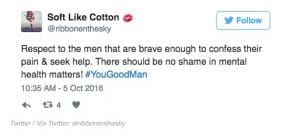

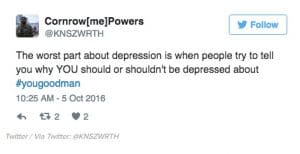







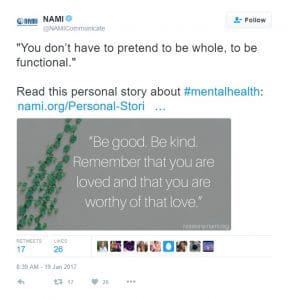
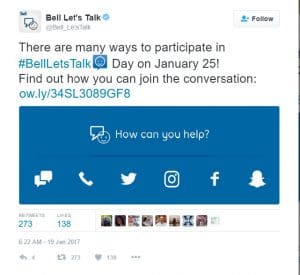

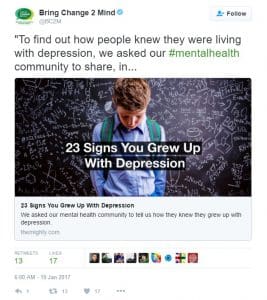







Recent Comments